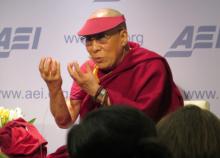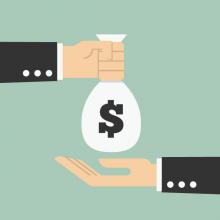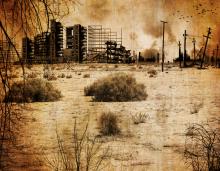Capitalism

Although King should rightly be lifted up as a hero of nonviolence and deeply Christian minister, we need to be reminded of King's radical legacy. King harshly criticized white people who failed to support black leadership. And particuarly toward the end of his life, King began to speak out about economic injustice and militarism, decrying the ills of capitalism and the Vietnam War.
As you remember today a leader who was murdered for his political beliefs, take a moment to reflect on these nine quotes:

AN UNUSUAL TITLE recently caught my eye at the library. The book is called The Moral Molecule: How Trust Works, by Paul J. Zak. An economist with obvious interests in biology, psychology, and religion, Zak’s numerous experiments demonstrate that when someone is shown a sign of trust or when one’s empathy is engaged, a certain molecule called oxytocin surges in the brain and blood.
“When oxytocin surges,” says Zak, “people behave in ways that are kinder, more generous, more cooperative, and more caring.” In other words, they follow the Golden Rule of treating others as you want to be treated. Zak eventually demonstrates how oxytocin can work within economic systems, which reminded me of a children’s song we sang at a church I used to attend in Chicago: “Love is like a magic penny. Hold it tight and you won’t have any. Lend it, spend it, and you’ll have so many they’ll fall all over the floor!”
And that reminded me of research I had done on the early Jerusalem church in the book of Acts. If there ever were oxytocin surges, it must have been at Pentecost and in the days and years of the shared economic community that followed!
Two summary texts describe the common life shared among these earliest believers: Acts 2:44-47 and 4:32-37. The first tells of their daily life together, distributing possessions, worshiping in the temple, and eating a daily communal meal in various households. The second passage describes the renunciation of private ownership. Believers sold their land and homes and gave the money to the community to be distributed “as any had need” (4:35).
Why did they do this? Wasn’t it impractical and more trouble than it was worth? Didn’t they soon have to cope with cheaters like Ananias and Sapphira (5:1-11) or complaints from Hellenist widows (6:1-6)? Didn’t that radical idealism soon peter out and people go back to their former lifestyles?
Interpreting through middle-class mirrors
My research on how these economic texts have been interpreted throughout Christian history was eye-opening. Ever since market capitalism arose in the 14th century, many commentators considered the communalism of the Jerusalem church to be unrealistic. For example, John Calvin, a 16th century community organizer, writes in his Acts commentary that he had to “properly” interpret communal sharing in 2:44 “on account of fanatical spirits who devise a koinonia of goods where all civil order is overturned.” He especially criticizes the Anabaptists of the time, because “they thought there was no church unless all mens’ (sic) goods were heaped up together, and everyone took therefrom as they chose.” Instead, Calvin recommends that “common sharing ... must be held in check.”
The rise of historical criticism during the 19th century in the West led to much skepticism about the accuracy of biblical texts. Luke wrote decades later, scholars asserted, idealizing the early church in Acts. The Jerusalem believers were very poor and had to help each other out, so Luke turns this grim picture into a Golden Age of sharing. In his 1854 commentary, Edward Zeller maintained that Acts 1 to 7 was full of legends and fictitious stories that Luke himself created.
The conservative reaction to such skepticism was to affirm the historicity of the early chapters of Acts—but to see this as a socialist experiment that soon failed and was never tried again. Its failure was confirmed by the poverty of the Jerusalem church in Acts 11:27-29, where the disciples at Antioch decided to “send relief to the believers living in Judea.”
No doubt these notions about the community of goods in Acts 2 to 6 prevail in many churches today. But both perspectives get it wrong because scholars and laypersons alike read these texts out of their own economic situation—Western capitalism. For middle and upper-middle classes (from which most biblical scholars emerge), capitalism has worked well. As a political and economic system, it has staunchly opposed Marxist and other ideas of socialist communalism, often perceived as “godless.”
This hostility has made it almost impossible to view the socialism of the early Jerusalem church as a positive development or one that survived more than a few years. For example, G.T. Stokes’ 1903 Acts commentary in the English Expositor’s Bible series declared that the Jerusalem experiment was a socio-economic disaster that should never have happened. One of the evils it produced, according to Stokes, was the conflict between the Hellenist and Hebrew widows in Acts 6:1. Stokes assumes they were destitute widows fighting over poor relief. Reflecting Victorian class distinctions and paternalistic attitudes, he asserts, “No classes are more suspicious and more quarrelsome than those who are in receipt of such assistance ... Managers of almshouses, asylums, and workhouses know this ... and ofttimes make bitter acquaintance with that evil spirit which burst forth even in the mother church of Jerusalem.”

Black Friday sales have been advertised for weeks now it seems. Doorstoppers, insane discounts, buy 1-get 1 free, and other mega sales are coming at us whether we want them to or not. Some stores are opening before the crack of dawn on Friday morning and others are not even closing from Thursday morning to Friday evening. The pressure to shop and spend is pretty intense. My social media feeds are equally filled with people excited about shopping and those who are pledging not to shop at any stores that have chosen to open on Thanksgiving Day. The debate is pretty intense at times. There are major opinions on both sides.
I have both shoppers and non-shoppers in my family. My mother and my brother-in-law are two of the shoppers. They love to shop and I mean that they LOVE to shop. They are professional level shoppers. They relish racking up major deals on Christmas gifts. So on more than one occasion I have watched them spend Thanksgiving evening planning their shopping run for Black Friday. They get out maps and sale flyers to plan their early morning excursion to make the most of the sales and the most of their time.

Capitalism has been overdone, increasing wealth and power in the pockets of only a few. At the same time, poverty has been growing. Is that moral? Is that “do unto others?”
The cry we hear so much is that capitalism’s free markets lead to a free society. That has not been the result for people on the lower poverty rungs.

When Jesus called the first disciples, he totally disrupted their economic lives. Simon and Andrew, James and John were working for their family business, as they were raised to do. Their fathers were fisherman, just like their fathers’ fathers, stretching back beyond memory. Fishing was a way to make money, but it was also much more than that. The family business provided a sense of place, of meaning. It was a social order that allowed each member of the family to know exactly where they fit.
Only when we understand this can we begin to grasp the radical nature of Jesus’ invitation to his first followers and friends: Follow me, and I will make you fish for people. Jesus offered an entirely different economic and social order. His was an invitation without safety nets, justifications, or guarantees. The first disciples immediately abandoned their nets, their livelihood, the whole social order that gave them a place to stand. They left everything, even their own worldview, to follow Jesus.

Pope Francis has called “unbridled capitalism” the “dung of the devil” and criticized it for doing little to help the poor.

TRANSCRIPT
GWEN IFILL: Pope Francis’ upcoming visit to the U.S. next week is generating huge interest and expectation.
Part of that excitement is rooted in the different tone the pope has taken on a number of issues, from marriage to the role of women in the church. But he has also issued a tough critique of capitalism and called for more action on climate change.

SINCE HIS ELECTION IN 2013, Pope Francis has been widely praised. But in this interview, conducted by Italian journalists Andrea Tornielli and Giacomo Galeazzi before the release of the encyclical “Laudato Si’,” Pope Francis speaks about the environment and economic justice; his perspectives on these topics have elicited harsh criticism from some.
How important is it for Christians to recover a sense of care for creation and sustainable development? And how do we ensure that this is not confused with a certain environmentalist ideology that considers humanity the real threat for the well-being of our planet?
Pope Francis: For the protection of creation we must overcome the culture of waste. Creation is the gift that God has given to humanity so it can be protected, cultivated, used for our livelihood, and handed over to future generations. The vocation to take care of someone or something is human, before being Christian, and affects all; we are called to care for creation, its beauty, and to respect all creatures of God and the environment in which we live. If we fail in this responsibility, if we do not take care of our brothers and sisters and of all creation, destruction will advance. Unfortunately, we must remember that every period of history has its own “Herods” who destroy, plot schemes of death, disfigure the face of man and woman, destroying creation.
But when humanity, instead of being custodian, considers itself to be the master, it ... moves toward destruction.

The Rev. Martin Schlag is a trained economist as well as a Catholic moral theologian, and when he first read some of Pope Francis’ powerful critiques of the current free market system he had the same thought a lot of Americans did: “Just horrible.”
But at a meeting on May 11 at the Harvard Club, Schlag, an Austrian-born priest who teaches economics at an Opus Dei-run university in Rome, reassured a group of Catholics, many from the world of business and finance, that Francis’ views on capitalism aren’t actually as bad as he feared.
AS ICE CREAM entrepreneurs, Jerry and I have been on a journey that has led us squarely to the conclusion that, while there are many ways that a business can use its power to improve people’s quality of life, the most effective lever for economic and social justice is the government.
Business can use its voice to influence government for good. But too often big corporations use the system of unlimited political “donations”—a system that John McCain calls “legalized bribery”—to skew the government in favor of their own narrow self-interest. That’s why I’m devoting my time and treasure to hacking at a root cause of injustice: big money in politics and crony capitalism.
A nationwide poll of small-business owners commissioned by Small Business Majority found more than three-fourths (77 percent) of small employers say big businesses have a significant impact on government decisions and the political process, whereas a mere 24 percent say small businesses have a significant impact on the process.

In a marketplace unfettered by ethical restraint, a sense of duty, concern for others, or even basic shame, 25 hedge fund managers gave themselves a 50 percent pay boost in 2013.
Never mind that hedge funds’ performance, on average, tanked for the fifth consecutive year.
These 25 men wanted big bucks, so they took them: a total of $21 billion. All for managing wealth that someone else created and, except for a few, not managing it particularly well.
The top earner paid himself $3.5 billion for 2013.



Some of the brightest pro-business minds in the nation prodded the Dalai Lama on Thursday to offer a warm endorsement of capitalism.
But during an appearance by the spiritual leader of Tibetan Buddhism at the American Enterprise Institute, one of the world’s most stalwart and, in conservative circles, respected free enterprise think tanks, they came up short.
The Dalai Lama was the star participant in a morning of panels on “moral free enterprise” and “human happiness.”
Asked by AEI President Arthur Brooks and Columbia Business School Dean Glenn Hubbard whether he agrees that the free enterprise system is the most moral of economic systems, and why he thinks the U.S. is the richest nation on earth, the Dalai Lama answered in broken English with his own question: What do you mean by rich?


Jesus was quite clear that our allegiance was to be with the POOR, not the barons of Wall Street.
God's laws are immutable Gravity. Aging. Those sorts of things. We cannot change them. But we DO know that mere humans MADE UP the laws of the market economy and we don't have to follow its rules. We can choose to, but it’s a choice.
The rules that run our capitalistic system were invented by us. And we really do not have to play by those rules.

Tomorrow, millions of people will gather across this great nation to celebrate Thanksgiving: the time in our calendar where we pause to give thanks for the year that has past, for family, loved ones, new additions and to remember those that have gone on before us. We share stories, we laugh, we cry — and for many of us we eat too much. For centuries, families have gathered together to pause and to say thanks, even if it is just for one day.
This year, however, I am going to make a bold statement: I am declaring that Thanksgiving to some is obsolete, if not dead. Why such the bold statement? It seems that since the day after Halloween, the focus has been on lights, bows, trees, candy canes, Santa and the Christmas story. In a mad dash to celebrate the birth of Jesus Christ and in the midst of people complaining about the store employee’s not saying “Merry Christmas,” we have forgotten to stop and be thankful.

Laying out a blueprint for the issues that are likely to define his papacy, Pope Francis on Tuesday issued a biting critique of capitalism, calling on world leaders to fight against poverty and for the rich to share their wealth, and urging the media to adjust its priorities.
“How can it be that it is not a news item when an elderly homeless person dies of exposure, but it is news when the stock market loses two points?” Francis asked in an 84-page “apostolic exhortation” that is widely seen as a road map for his papacy akin to a presidential State of the Union address.
“How can we continue to stand by when food is thrown away while people are starving?” he asked. “Today, everything comes under the laws of competition and the survival of the fittest, where the powerful feed upon the powerless. As a consequence, masses of people find themselves excluded and marginalized: without possibilities, without any means of escape.”

EVERY SUMMER brings the end of the world. But not since 1998’s Deep Impact and Armageddon both threatened the end of the world with objects from space has there been such apocalypse redundancy in summer blockbusters: This year, class wars, real wars, ecological exhaustion, aliens, and zombie viruses destroyed our planet in as many different ways.
In her excellent e-book The Zombies are Coming!, Kelly J. Baker reminds us that apocalyptic fantasies have been part of the popular American imagination since at least the Puritan hellfire sermon. Even without a common religious narrative to guide them, end-of-the-world stories mostly function as a form of cultural critique and utopian longing. We can only imagine a desired future out of the ashes of the utterly destroyed present. In other words, things are going to have to get a lot worse before they get better.
If Baker is right that we seize on apocalyptic fantasies both to express a deep feeling that something is very wrong with our current state of affairs and to imagine some better alternative, then this summer’s world-ending movies display a profound lack of imagination. Most of them are not even particularly good at conceiving the end of the world, and none of them offer us a vision of how things might be different.
After Earth, for example, is more an overblown coming-of-age story than an apocalyptic thriller. The film follows Kitai (Jaden Smith) as he is guided via walkie-talkie by his wounded father (Will Smith) across an unknown planet. The planet turns out to be Earth 1,000 years after humans have high-tailed it to outer space. But since we never learn why humans had to leave, the apocalyptic frame feels like little more than an excuse to raise the stakes of Kitai’s journey and a chance to show off some fantastic technology. Kitai’s array of super-cool gadgets pretty much guarantees the creatures he meets will have to be more menacing than anything the old Earth could manufacture. The few glimpses we get of humanity’s new planet suggest a post-racial melting pot where everyone speaks a little Chinese and a lot of English and has a preference for flowing linen garments and nautical decoration schemes. I suppose this is a vision of a better tomorrow, but it felt more like a futuristic Pier One ad.
WHEN MY DAUGHTER, Jessica, was 7 years old, some of her best friends had American Girl dolls, so of course she desperately needed one as well. We asked three or four family members to chip in—these were expensive dolls—and got her one for Christmas.
Her doll, “Addy,” came with a story, as did each in the American Girl line. Addy and her mother had escaped from slavery in the American South, and they “followed the drinking gourd” north to Philadelphia, where they were eventually reunited with the rest of Addy’s family. It was a gripping story, especially for a 7-year-old. And the fact that Addy was about my daughter’s age made it all the easier for her to connect.
“It wasn’t so much that I learned ‘facts’” about slavery and race from the Addy stories, Jessica, now 27, told me recently, “but they made it all more personal. Addy was young, like me—I could relate to it.”
Other women who grew up with the dolls echoed that sense of connection with the various American Girl stories. Janelle Tupper, campaigns assistant at Sojourners, was around 7 when she received the “Kirsten” doll, a Swedish immigrant to the U.S. “My most distinct memory from the stories was that, on the boat, her best friend dies of cholera,” Tupper said. “Reading that passage was pretty devastating to me as a kid.” Other books in the American Girl series addressed issues of the day, from child labor to women’s suffrage. And while Tupper said she wasn’t aware as a child of the social justice themes in the stories—“I was just imagining life in the different time periods through the eyes of a character I identified with”—she now sees the series as addressing “societal change in terms that an 8- year-old can understand, often told through the characters’ friendships and family stories.”